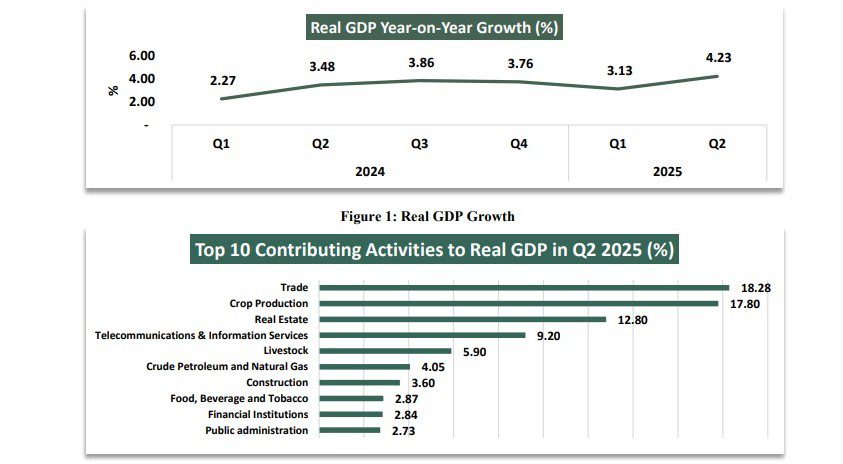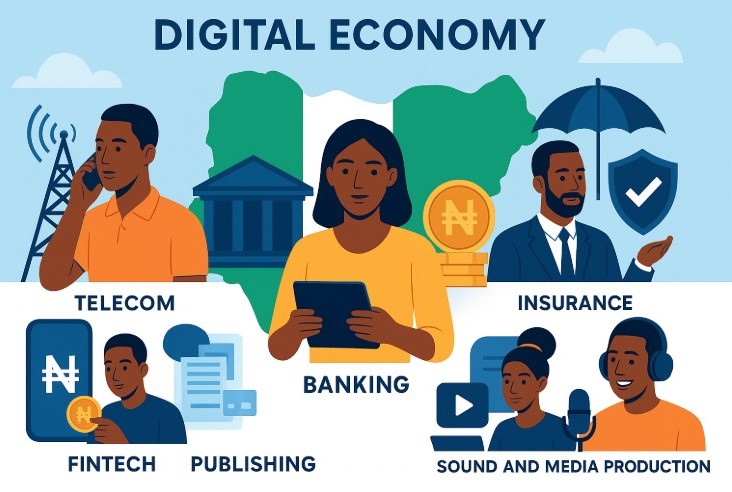







































Digital economy contributes 14.4% of Nigeria’s GDP growth in Q2 2025
 INSURANCE
INSURANCE
 2024
2024
 2024
2024
 TOP
TOP
 HIGHER
HIGHER
The Digital Economy sector contributed N7.37 trillion to the Nigerian Real Gross Domestic Product (GDP) during the second quarter of 2025. This represents a 14.4% contribution to the total N51.20 trillion.
This was revealed in the recent report by the National Bureau of Statistics (NBS). It showed that the country’s total real GDP grew by 4.23% during the quarter compared to 3.13% in Q1 2025.
The Nigerian Digital Economy sector comprises the Information and Communication (I&C) sector and the Financial Institutions (FI) sector. In the breakdown of their percentage contribution to real GDP, I&C saw 11.18% while FI recorded 3.23% during the quarter under review.
In addition, these sectors made the list of the top 10 performing sectors in Q2 ’25. I&C is fourth with a 9.20% to Real GDP growth, while FI dropped from eighth in Q1,25 to ninth in Q2 ’25 with a 2.84% contribution. Other sectors in the top five include Trade (18.28%), Crop Production (17.80%), Real Estate (12.80%) and Livestock (5.90%).
Notably, the sector has remained a top contributor to the Nigerian economy, hugely driven by telecoms and the financial industry.

In an extensive breakdown, the I&C sector, during Q2 ’25, recorded a YoY growth rate of 6.61% in real terms and 9.58% on a quarter-on-quarter basis. The I&C sector comprises telecommunications, publishing, sound and music production and broadcasting.
In terms of its contribution to total real GDP during Q2’25, the sector contributed 11.18%, higher than Q2’24, where it contributed 10.93%. Telecoms contributed the highest quota with 82.4%, followed by broadcasting (12.7%), sound and music production (4.8%) and publishing (0.1%).
The F&I sector, which comprises Financial Institutions and Insurance, recorded a 3.23% contribution to Nigeria’s total real GDP in Q2’25. This is higher than the 2.89% received in Q2’24 by 0.33% points.
Of the contribution, Financial institutions such as banks and fintechs saw an 87.5% input, while the insurance industry contributed 12.5%.
Furthermore, the Digital Economy Sector contributed a total of N7.37 trillion to the nation’s real GDP. The I&C recorded N5.72 trillion while the FI saw N1.65 trillion during the first quarter of 2025.
The larger share of the I&C sector is attributed to the telecommunications industry. The financial institution industry added N1.45 trillion, while the insurance industry added about N198 billion.
| The Nigerian Digital Economy in Q2 2025 | ||||
| Information and Communications | Financial Institutions | Total | ||
| Telecommunications | N4.7 trillion (82.4%) | Financial Institutions | N1.4 trillion (87.5%) | |
| Publishing | N8 billion (0.1%) | Insurance | N198.6 billion (12.5%) | |
| Sound and Media Production | N279 billion (4.8%) | |||
| Broadcasting | N726 billion (12.7%) | |||
| Total | N5.72 trillion | N1.65 trillion | N7.37 trillion | |
| % to Real GDP | 11.80% | 2.84% | 14.40% | |
Also Read: Digital Economy contributed 14.19% as Nigeria’s real GDP grew by 3.31% in Q1’25.
Overall, Real GDP saw a YoY real GDP growth rate of 4.23%, higher than the 3.48% recorded in the second quarter of 2024 and the 3.13% recorded in Q4 2024. In terms of share of the GDP, the industry sector contributed more to the real GDP in Q2 2025 at 17.31%.
In monetary terms, Nigeria’s real GDP increased to N51.20 trillion from N49.34 trillion.

The NBS also released the rebased GDP figures, using a base year of 2019. Real GDP growth in 2020 stood at -6.96% and improved to 0.95% in 2021. Higher growth rates were recorded in 2022 and 2023, at 4.32% and 3.04%, respectively. While 2024 recorded a real GDP growth rate of 3.38%.
Nigeria’s digital economy: Q1’25 vs Q2’25
During the previous quarter, the digital quarter, the digital economy sector contributed 14.19% to Nigeria’s real GDP, adding N7 trillion of the total N49.34 trillion.
The latest 14.4% at N7.37 trillion is an improvement compared to the 14.19% at N7 trillion of Q1’25 and 11.8% at N7.2 trillion of Q4’24.
During the previous quarter, I&C recorded a 10.59% (N5.2 trillion) real GDP, while FI saw 3.60% (N1.8 trillion) of the total real GDP. While the data shows an improvement for the I&C sector, the financial industry saw a drop in Q2’2025.
Overall, the digital economy sector witnessed a 1.5% increase in contributing real GDP, with 14.4% in the quarter under review compared to 14.19% during the first quarter of 2025.

Earlier this year, the Minister of Communications, Innovation, and Digital Economy, Dr Bosun Tijani, revealed that the digital economy sector attracted $191 million in foreign direct investment during Q1 2024, a 900% rise from the $22 million in Q1 2023. On outlook, Tijani said the sector holds prospects to generate $18.3 billion by 2026.
Industry players believe that the contribution of the digital sector to the economy will continue to grow. This follows the promise of significant investment, especially in the telecoms sector, with players such as MTN Nigeria and Airtel Nigeria doubling their infrastructural stake recently.

